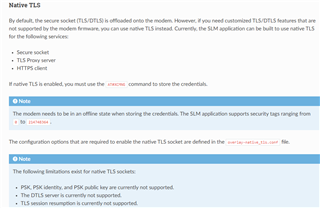Hi everyone,
I want to send large data with https protocol.
I edited the https_client sample split the data and looped send() for sending the large data.
But when I did send() once, I got error 128. Did the socket close by itself?
After I run send() once, I run close() -> tls_setup() ->connect() again. Then I can do send() again.
This is very time consuming, in a single loop, reconnecting takes 2 or 3 seconds in my environment. So I need a different solution.
Is it possible to loop send() continuously with the socket open? In the past, there have been similar case with the http protocol, but it seems that closing the socket with every send() is the solution.
https://devzone.nordicsemi.com/f/nordic-q-a/46086/nrf9160-dk-http-post-to-my-webserver
Is this still not improving? If I can send quickly even if I close the socket, it may be a solution.
HW:nRF9160DK
FW:modem v1.3.1
SDK v1.9.1
My LTE connection is LTE-M.
Best Regards,
Yukio Oyama



